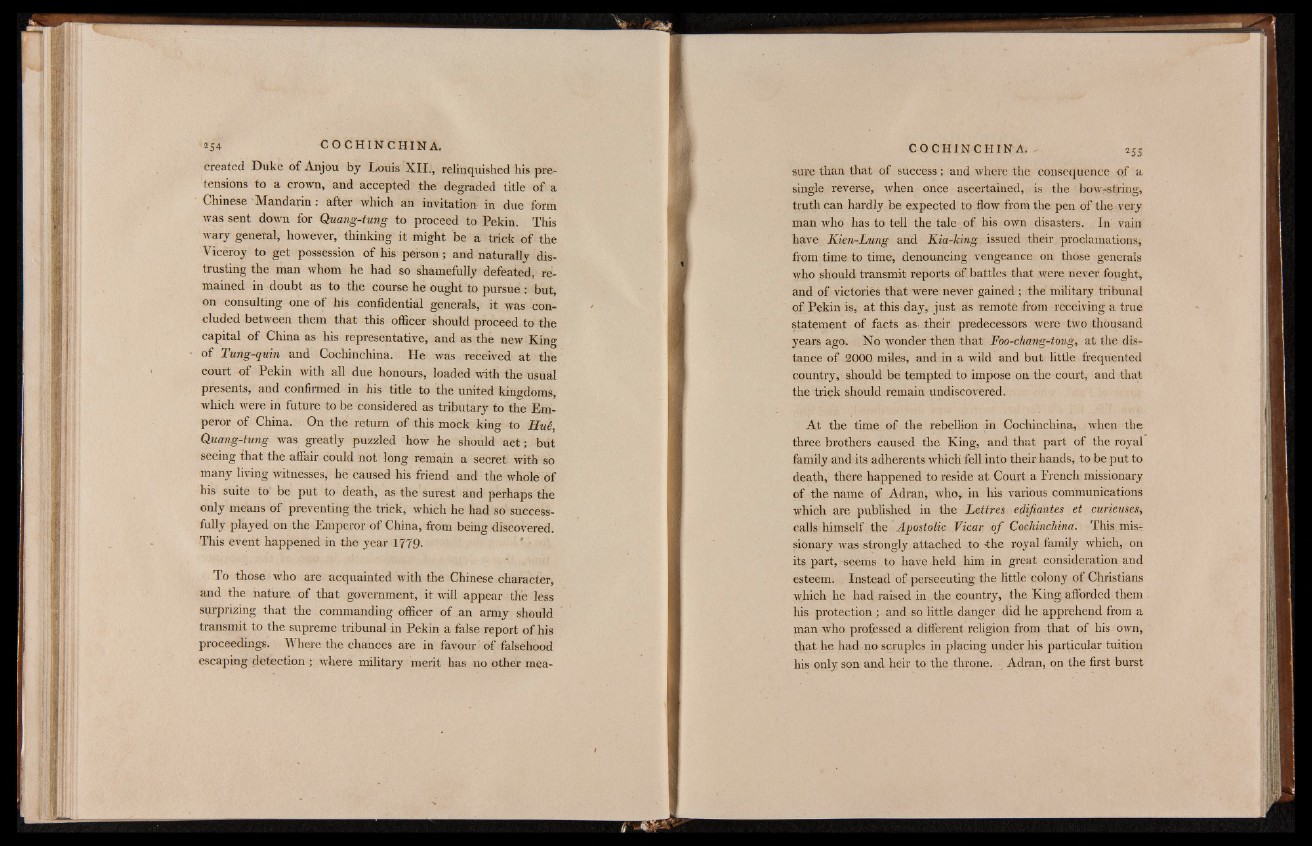
created Duke of Anjou by Louis XII., relinquished his pretensions
to a crown, and accepted the degraded title of a
Chinese IMandaiin - after which an invitation in due form
was sent down for Quang-tung to proceed to Pekin. This
wary general, however, thinking it might be a trick of the
Viceroy to get possession of his person ; and naturally distrusting
the man whom he had so shamefully defeated, remained
in doubt as to the course he ought to pursue : but,
on consulting one of his confidential generals, it was concluded
between them that this officer should proceed to the
capital of China as his representative, and as the new Xing
of Tung-quin and Cochincliina. He was received at the
court of Pekin with all due honours, loaded with the usual
presents, and confirmed in his title to the united kingdoms,
which were in future to be considered as tributary to the Emperor
of China. On the return of this mock king to Hué,
Quang-tung was greatly puzzled how he should a c t; but
seeing that the affair could not long remain a secret with so
many living witnesses, he caused his friend and the whole of
his suite to be put to death, as the surest and perhaps the
only means of preventing the trick, which he had so successfully
played on the Emperor of China, from being discovered.
This event happened in the year 1779-
To those who are acquainted with the Chinese character,
and the nature of that government, it will appear the less
surprizing that the commanding officer of an army should
transmit to the supreme tribunal in Pekin a false report of his
proceedings. Where the chances are in favour of falsehood
escaping detection ; where military merit has no other measure
than that of success; and where the consequence of a
single reverse, when once ascertained, is the bow-string,
truth can hardly be expected to flow from the pen of the very
man who has to tell the tale of his own disasters. In vain
have Kien-Lung and Kia-king issued their proclamations,
from time to time, denouncing vengeance on those generals
who should transmit reports of battles that were never fought,
and of victories that were never gained; the military tribunal
of Pekin is, at this day, just as remote from receiving a true
statement of facts as. their predecessors were two thousand
years ago. No wonder then that Foo-chang-tong, a t the distance
of 2000 miles, and in a wild and but little frequented
country, should be tempted to impose on the court, and that
the trick should remain undiscovered.
At the time of the rebellion in Coehinchina, when the
three brothers caused the King, and that part of the royal
family and its adherents which fell info their hands, to be put to
death, there happened to reside at Court a French missionary
of the name of Adran, who,, in liis various communications
which are published in the Lettres edifiantes et curieuses,
calls himself the Apostolic Vicar, o f Cochincliina. This missionary
was strongly attached to -the royal family which, on
its part, seems to have held him in great consideration and
esteem. Instead of persecuting the little colony of Christians
which he had raised in the country, the King afforded them
his protection ; and so little danger did he apprehend from a
man who professed a different religion from that of his own,
that he had no scruples in placing under his particular tuition
his only son and heir to the throne. Adran, on the first burst